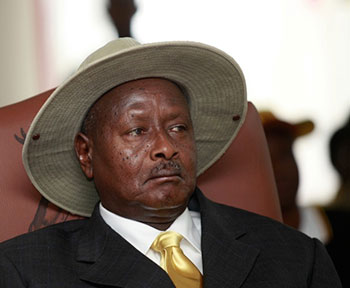Blog
Posted on March 3, 2014
By Kelly Gibbs
 When Ugandan President Yoweri Museveni signed an anti-gay law in late February that effectively criminalizes the LGBTI community of over half a million people and any who support it, he sent a strong message to the world. Now, one of his spokespersons is tweeting provocative responses to the world’s reactions, including such missives as “The West can keep their ‘aid’ to Uganda over homos; we shall still develop without it.”
When Ugandan President Yoweri Museveni signed an anti-gay law in late February that effectively criminalizes the LGBTI community of over half a million people and any who support it, he sent a strong message to the world. Now, one of his spokespersons is tweeting provocative responses to the world’s reactions, including such missives as “The West can keep their ‘aid’ to Uganda over homos; we shall still develop without it.”
A law promoting bigotry of this magnitude and forcing the opinion and compliance onto its citizens is a sad step backwards for a country that has had a recent history of promising growth.
The law, called the Uganda Anti-Homosexuality Act of 2014, was passed by the Ugandan parliament to place practicing homosexuals in jail for life instead of the original death penalty proposal in December. The law mirrors the appalling treatment of the LGBTI community seen in many regions in Africa, notably in South Africa, where “corrective rape” is used to systematically rape or sexually assault perceived or actual gay women and men in order to ‘cure’ them of their homosexuality1. Ironically, South Africa is one of the only African countries to allow gay marriage.
Continue Reading
Posted on February 27, 2014
By Katherine Schroeder
Studying overseas can provide an opportunity to gain valuable experience in the field of international development. However, the experience often comes with a high price tag, one that many college students cannot afford. Also, many schools lack study-abroad programs in developing countries.
Help is available through several federally-funded grants, including the Critical Language Scholarship (CLS) and the Foreign Language and Area Studies Program (FLAS). Each provides full or partial funding for students studying languages and volunteering in a variety of countries. Knowledge of a native language is helpful in understanding culture and being able to manage programs and direct workers abroad.
The CLS program is a fully-paid summer scholarship that is open to undergraduates travelling to a variety of countries including China, India, Indonesia, and Bangladesh. Participants can receive academic language credit for their time abroad and live with host families while participating in intensive language classes as well as volunteer work.
Continue Reading
Posted on February 20, 2014
By Kelly Gibbs
Global Washington recently hosted its monthly Executive Director Roundtable featuring Ndudi Ikoro Chuku, Executive Director of Mission Africa. The organization aims to empower children and families in the remote villages of Nigeria, Tanzania, Uganda and Kenya by providing support in three core areas: education, healthcare and poverty alleviation.
Ms. Chuku talked about her work in Africa and the challenges of running a small NGO, and she shared insights on her strengths and weaknesses as a leader. This led to a robust discussion among everyone in the room, touching on issues that cross sectors and issue areas. Chuku was joined by several leaders of other GlobalWA member organizations: Theo Chocolate, Literacy Bridge, The Post Harvest Project, Antioch University and Dwankhozi Hope.
Continue Reading
 When Ugandan President Yoweri Museveni signed an anti-gay law in late February that effectively criminalizes the LGBTI community of over half a million people and any who support it, he sent a strong message to the world. Now, one of his spokespersons is tweeting provocative responses to the world’s reactions, including such missives as “The West can keep their ‘aid’ to Uganda over homos; we shall still develop without it.”
When Ugandan President Yoweri Museveni signed an anti-gay law in late February that effectively criminalizes the LGBTI community of over half a million people and any who support it, he sent a strong message to the world. Now, one of his spokespersons is tweeting provocative responses to the world’s reactions, including such missives as “The West can keep their ‘aid’ to Uganda over homos; we shall still develop without it.”